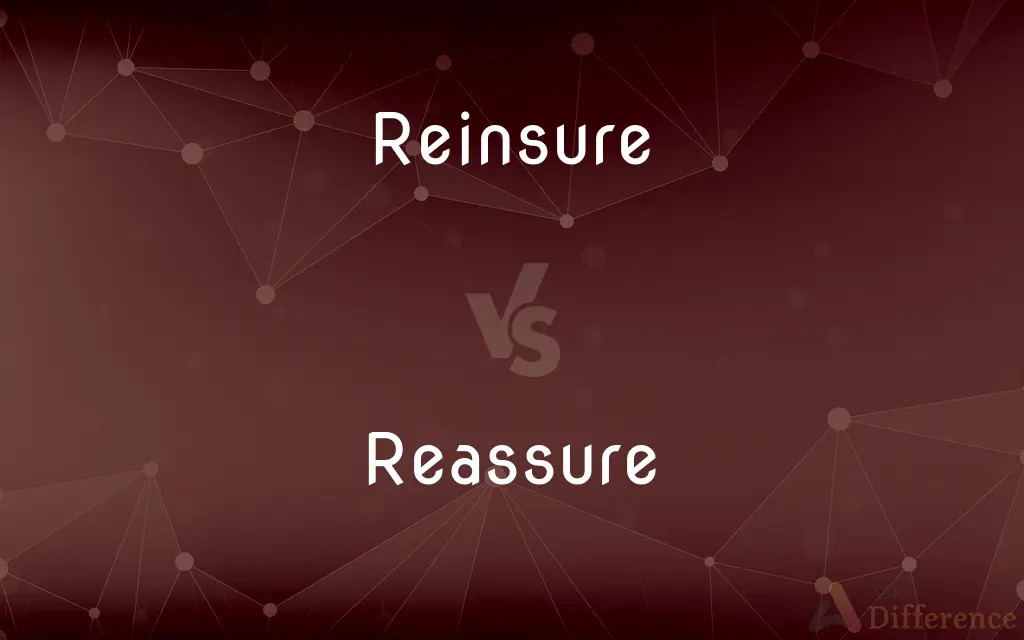Reinsure vs. Reassure — What's the Difference?
By Fiza Rafique & Maham Liaqat — Updated on March 15, 2024
Reinsure involves sharing insurance risk among companies, while reassure means to alleviate doubts and fears.

Difference Between Reinsure and Reassure
Table of Contents
ADVERTISEMENT
Key Differences
Reinsure refers to the process by which an insurance company transfers part of its risk to another insurance company, known as a reinsurer, to mitigate potential losses. This is a common practice in the insurance industry to maintain stability and spread risk, especially for large or catastrophic events. Whereas, reassure involves comforting someone or restoring confidence, often by addressing concerns or doubts. It is a personal or emotional support mechanism, typically involving communication or gestures that convey security or certainty.
The context in which reinsure and reassure are used is fundamentally different. Reinsure is used within the insurance and financial sectors, focusing on risk management and financial stability. On the other hand, reassure is used in a wide range of personal, professional, and social contexts, aiming to provide emotional support or comfort.
The implications of reinsure and reassure also differ significantly. Reinsuring can affect the financial health of insurance companies and, by extension, their clients and the broader economy. Reassuring, however, primarily impacts individuals' emotional or psychological state, influencing personal well-being and interpersonal relationships.
Understanding the distinction between reinsure and reassure is crucial for clear communication. Misusing one term for the other can lead to confusion, especially in professional settings where the specific terminology has significant implications.
Comparison Chart
Definition
To transfer part of insurance risk to another company
To alleviate doubts or fears, to comfort
ADVERTISEMENT
Context
Insurance and financial sectors
Personal, professional, social contexts
Main Purpose
Risk management and financial stability
Emotional support and comfort
Implications
Affects financial health and stability
Influences emotional and psychological well-being
Communication
Often involves contracts and agreements
Involves verbal reassurance, gestures, actions
Compare with Definitions
Reinsure
The process of shifting risk from one party to another.
Companies often reinsure policies to manage potential losses.
Reassure
To provide emotional support.
After the loss, she reassured her friend with kind words and presence.
Reinsure
An insurance company that assumes risk from another insurer.
Global reinsurers help spread the risk of natural disasters.
Reassure
To remove uncertainties or fears.
The manager reassured the team about job security amidst rumors.
Reinsure
When a reinsurer further transfers risk.
To mitigate its own exposure, the reinsurer entered into a retrocession agreement.
Reassure
Positive reinforcement or validation.
The doctor reassured the patient about the effectiveness of the treatment.
Reinsure
An agreement to reinsure a category or portfolio of risks.
The company entered a treaty reinsurance for all property policies.
Reassure
To strengthen belief or confidence.
Before the performance, the teacher reassured the student of his abilities.
Reinsure
The portion of risk passed to a reinsurer.
The insurance firm decided on a 20% cession of its hurricane exposure.
Reassure
To soothe in times of disappointment or grief.
He reassured his sibling with a consoling hug after the setback.
Reinsure
To insure again, especially by transferring all or part of the risk in a contract to a new contract with another insurance company.
Reassure
To restore confidence to
I felt reassured that I was up to the job.
Reinsure
(transitive) To insure again (extending or replacing prior insurance).
Reassure
To assure again
We reassured him that the project was on schedule.
Reinsure
(transitive) To place insurance on the contract that insures something (allowing the insurer to offset risk in the same way the insuree did).
Reassure
To reinsure.
Reinsure
To insure again after a former insuranse has ceased; to renew insurance on.
Reassure
(transitive) To assure anew; to restore confidence to; to free from fear or self-doubt.
The boy's mother reassured him that there was no monster hiding under the bed.
Reinsure
To insure, as life or property, in favor of one who has taken an insurance risk upon it.
The innsurer may cause the property insured to be reinsured by other persons.
Reassure
(transitive) To reinsure.
Reinsure
Provide additional insurance for
Reassure
To assure anew; to restore confidence to; to free from fear or terror.
They rose with fear, . . . Till dauntless Pallas reassured the rest.
Reinsure
Insure again by transferring to another insurance company all or a part of a liability assumed
Reassure
To reinsure.
Reinsure
Insure again by assuming all or a part of the liability of an insurance company already covering a risk
Reassure
Cause to feel sure; give reassurance to;
The airline tried to reassure the customers that the planes were safe
Reassure
Give or restore confidence in; cause to feel sure or certain;
I reassured him that we were safe
Common Curiosities
How can one effectively reassure someone?
Effective reassurance often involves empathetic listening, understanding the person's fears, and providing comforting words or actions.
What are common situations where reassurance is needed?
Reassurance may be needed in times of uncertainty, fear, stress, or grief, such as during personal challenges or significant life changes.
Can an individual reinsure something?
Typically, reinsurance is a transaction between insurance companies, not individuals.
What are the benefits of reassurance in a workplace setting?
In the workplace, reassurance can enhance employee morale, increase productivity, and foster a positive and supportive work environment.
What is the difference between facultative reinsurance and treaty reinsurance?
Facultative reinsurance is arranged for individual risks, while treaty reinsurance covers a range or category of risks under a single agreement.
Are there different types of reinsurance agreements?
Yes, there are several types of reinsurance agreements, including treaty reinsurance and facultative reinsurance, each with specific terms and purposes.
What role do reinsurers play in the global insurance market?
Reinsurers provide a safety net for primary insurers, allowing them to take on more risk and offer more coverage, contributing to a stable and resilient global insurance market.
What is the purpose of reinsurance?
Reinsurance is used by insurance companies to spread risk, ensuring financial stability and risk management.
Can reassurance be counterproductive?
Excessive or misplaced reassurance can sometimes be counterproductive, leading to dependency or diminishing an individual's ability to cope with challenges independently.
Is reinsurance mandatory for insurance companies?
While not mandatory by law, reinsurance is a critical risk management tool widely adopted in the insurance industry to ensure solvency and stability.
What factors do insurance companies consider when deciding to reinsure?
Insurance companies consider factors like risk exposure, capital management, regulatory requirements, and market conditions when deciding on reinsurance strategies.
How can reassurance impact a person's mental health?
Reassurance can significantly improve a person's mental health by reducing anxiety and stress, boosting confidence, and fostering a sense of security.
In what scenarios is reassurance particularly important for children?
Children especially need reassurance during times of change, stress, or uncertainty, such as moving to a new place, starting school, or facing family changes, to help them feel secure and supported.
How does reinsurance affect insurance policyholders?
Policyholders may not directly interact with reinsurance, but it benefits them by enhancing the insurer's capacity to pay claims, contributing to the overall health of the insurance market.
How does cultural context influence the act of reassuring someone?
Cultural norms and values can shape how reassurance is given and received, with variations in preferred communication styles, gestures, and expressions of support.
Share Your Discovery

Previous Comparison
Interest vs. Profit
Next Comparison
Sievert vs. BecquerelAuthor Spotlight
Written by
Fiza RafiqueFiza Rafique is a skilled content writer at AskDifference.com, where she meticulously refines and enhances written pieces. Drawing from her vast editorial expertise, Fiza ensures clarity, accuracy, and precision in every article. Passionate about language, she continually seeks to elevate the quality of content for readers worldwide.
Co-written by
Maham Liaqat















































